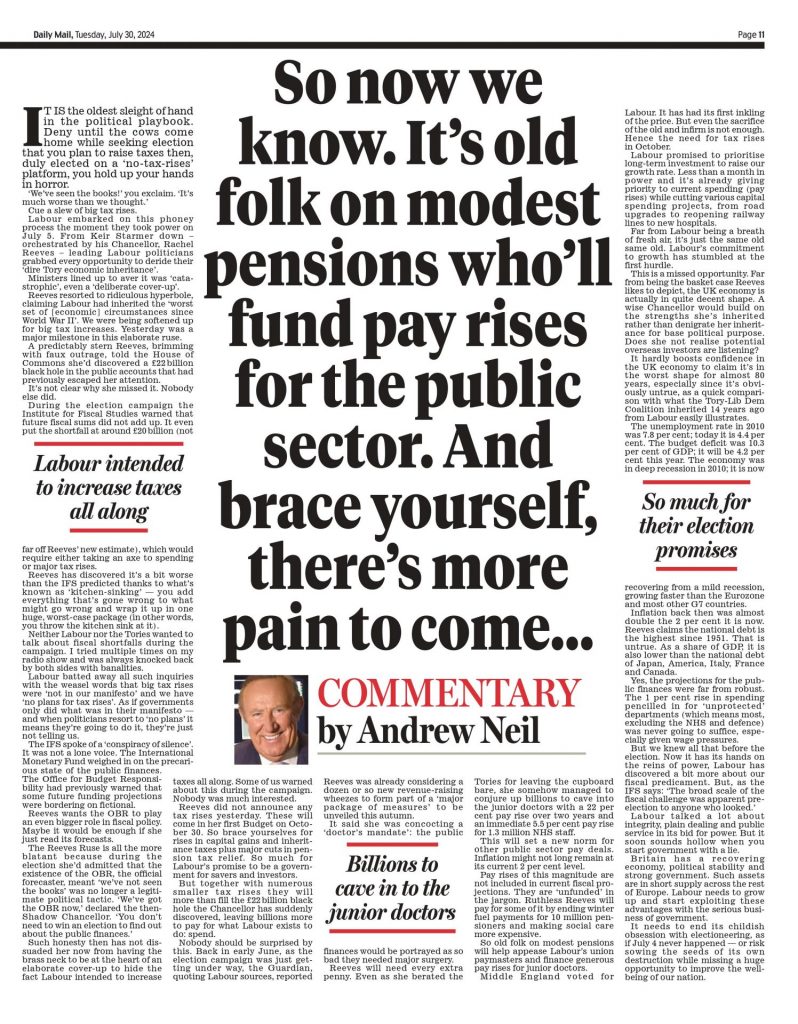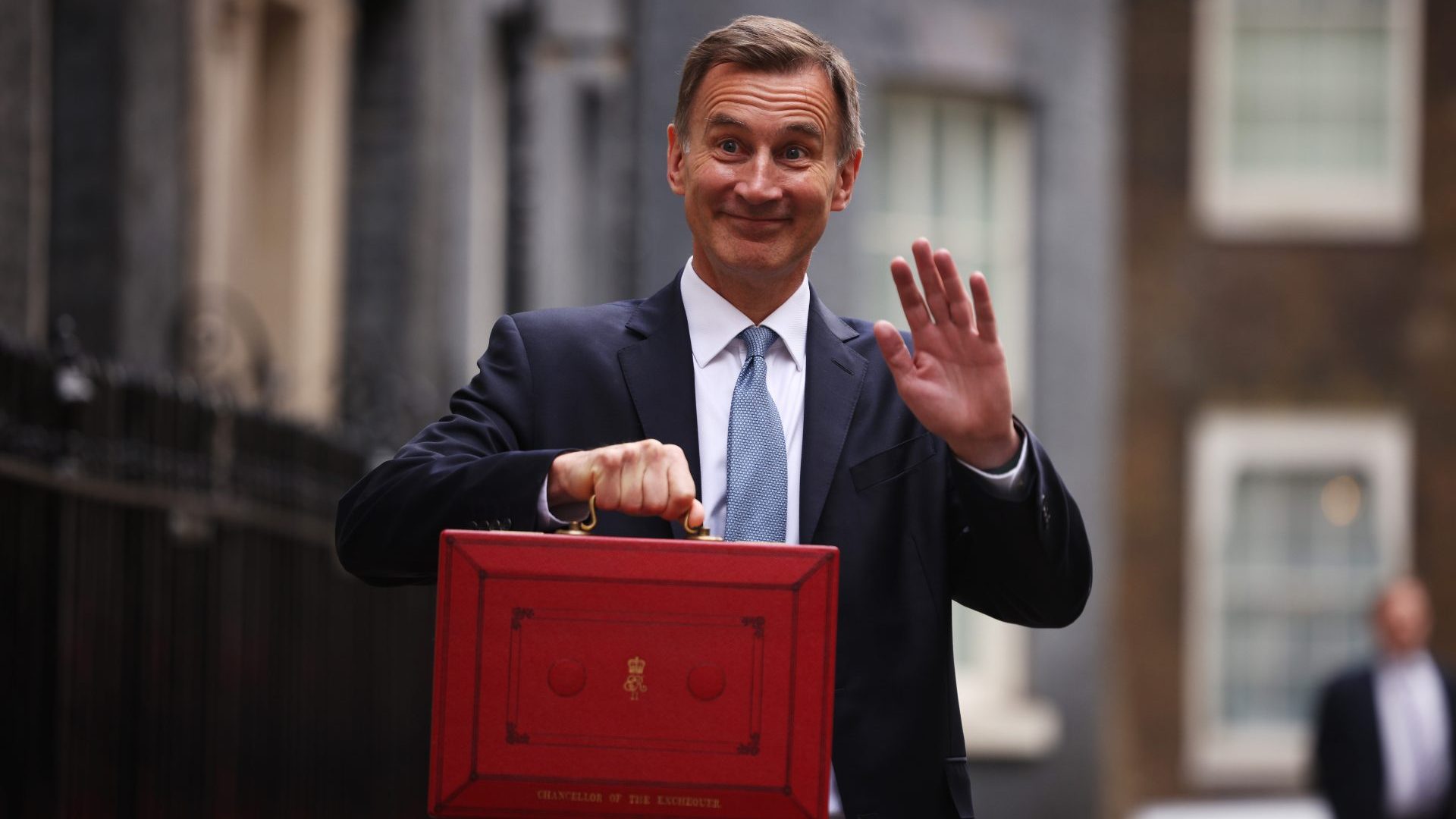Does David Attenborough need the country’s help to pay his electricity bill? Would Helen Mirren or Judi Dench shiver to death if we didn’t BACS them £200 each December? Would Paul Dacre and Andrew Neil – both firm advocates of cuts in the welfare budget – struggle without this bung from the taxpayer?
Of course not. None of them needs the annual winter fuel allowance and you’d like to think none of them wants it. But it seems Neil is determined that they should have it. For in his Mail column this week he was raging that we could now see Labour in its true colours – and that meant the “elderly and infirm” would be forced to pick up the bill for public sector pay rises.
It’s not clear where the infirm come into this, as the winter fuel payment goes only to pensioners, regardless of their state of health. It does not go to the disabled or the sick, regardless of the state of their finances.
Neil has since said that he neither wants nor takes the allowance. There is an opt-out mechanism, but for most people it just arrives in your bank account, so long as you were receiving the state pension in a specified week in September.
Last year, it was bumped up to £500, thanks to a special “cost of living payment” to mitigate the energy price rises caused by the war in Ukraine. A further tenner lands in the pot a couple of weeks later with the annual “Christmas bonus”. Just for surviving another year over 65.
You don’t even have to live long enough to use the cash to receive it. Last year the qualifying week started on Monday, September 19. My father-in-law went into hospital that day and died on Friday September 23. Come December, the DWP sent his estate a £600 cheque for the over-80s’ enhanced winter fuel payment. This is clearly nonsense.
There are legitimate arguments to be held over the existence and size of the fiscal black hole Rachel Reeves inherited from the previous Conservative government. She accuses her predecessor Jeremy Hunt of lying and covering up the scale of the problem; he says the figures were there for all to see and that she has made political choices on where to spend money and what to cut.
Responsible newspapers, like the FT, have tried to get to the bottom of this, tasking their own specialists and experts beyond the ubiquitous IFS with finding out who might have known what and when. Is the new chancellor feigning shock about the asylum overspend when she had already highlighted her suspicions in previous months?
There are also legitimate points to be raised about the offer to the junior doctors: will their settlement bring peace and tranquillity as Reeves hopes, or embolden other workers to disrupt our lives with more strikes, as Conservatives fear? Right wing alarm at the prospect of resurgent union power is ever-present, as is the belief that public sector workers are over-indulged.
The NHS and teachers’ pay rises are said to account for almost half of the alleged “£22bn black hole” – but even if Reeves had ignored the review bodies’ recommendations and restricted pay rises to an inflation-matching 2 per cent, as Hunt might have done, that would still have cost more than £3bn. So had the Tories won the election, they’d have had a 16bn shortfall – and they were promising £17bn in tax cuts. Where would that money have come from? I may have reached an age where not only do I receive the winter fuel handout, but where my memory is also somewhat unreliable, but I think welfare budget cuts were mentioned. Where was the concern for the poor and shivering then?
These are not the sort of questions that the Tory press cares to raise. During the election campaign they preferred to trumpet Rishi Sunak’s tax-cutting promises and his “bumper” deal for pensioners, complete with special tax code, and to parrot his warnings that Labour was “plotting” a £2,000 tax rise for every family.

Sunak clearly knew his successor was going to have to raise that sort of money from somewhere, but newspapers didn’t trouble themselves to question why or to look at how much money was actually in the pot. To be fair, both voters and journalists were let down by the lack of candour from both sides – and since no journalist was able to puncture that reticence, they resorted to surmise and speculation.
Now the Conservative-supporting papers are crowing “we told you so” and accusing Labour of hypocrisy – a not unreasonable charge, given the assertions (and challenges to Sunak) on winter fuel payments from Starmer, Reeves, Rayner and others in recent months. I guess they would counter that changing the parameters of a benefit and adjusting its distribution is not the same as scrapping it altogether – I’m not sure they ever promised to keep it as a universal benefit for all pensioners – but it’s not a good look.
Now, at last, Reeves has come clean and said there will be tax rises in the autumn. We all knew that. Many of us wished that she and Starmer would have said as much – and spelt out why – before the election, even though we understood why they didn’t. We also all suspected that capital gains and inheritance taxes were likely in her sights – which means the older generations again.
Having left it so late, the Chancellor has made herself an open target for those papers. And in the winter fuel payment announcement, she has provided them with a convenient distraction from having to consider the dire state of the nation’s finances (booming Britain anybody?) and the integrity of the politicians they support.
The Express will always be on the side of the oldies, but most editors know in their hearts that the universal winter fuel handout is unjustified and unsustainable. They also know that, while there will doubtless be people just above the pension credit threshold who will feel the pinch, these will number in the hundreds of thousands – not millions. Yet the 10 million who are set to lose the payment naturally provide the headline figure of choice.
But in case the Conservative papers have suddenly discovered feelings for people less well off than they are – and to counter some of the outlandish claims about Labour turning old people into paupers so that they will end up on the streets for the want of £200 a year – here are a few reasons why this was the right thing to do:
As we have been told, the restriction of the payment to those on other benefits is expected to affect about 10 million of the 11.4m current recipients. Just over 9 million of them pay income tax. That means they have other sources of income beyond the state pension. This is described by magazines aimed at an older audience as being “dragged into income tax”.
Younger people who earn more than £12,500 a year, and therefore pay income tax, do not get help from the state with their heating bills. Pensioners get free prescriptions, discounted (and sometimes free) travel, cut-price entry to local facilities such as gyms and swimming pools, concessionary rates at tourist attractions and cinemas, special discounted shopping days, and all sorts of other goodies that are not available to much younger people (though many are offered to over-60s).
When they reach 75, they are also entitled to a free TV licence, a benefit foisted on the BBC and defended to the death by the very papers that want the licence fee scrapped and the BBC emasculated. All of these concessions are predicated on the principle that pensioners are on fixed incomes and cannot do overtime or find a better-paid job to improve their finances.
Yet, as Patience Wheatcroft has written here, there are many people in their 60s, 70s and 80s who can and do continue working and contributing to public life. Should they be granted this extra boon as a reward for longevity?
Pensioners are less likely than younger families to be struggling with high rent or mortgages – indeed, they are more likely to have paid off their home loan and to be sitting on valuable properties.
Pensioners have their incomes protected by the “triple lock”, which Labour has promised to maintain (there will be the most almighty hoo-ha if it goes back on that). This gives them an annual pay rise of 2.5% or one equal to the inflation rate or the average private sector pay settlement in the three months from July to September, whichever is highest. Last year, that meant an increase of 8.4%. The nurses who look after them received 5%, the teachers who educate their grandchildren received 5.6%.
At the moment, private sector pay is rising by around 5.6%, so unless settlements over the coming month or so are more modest, next year’s increase will broadly match that being promised to nurses and teachers. Jeremy Hunt appeared to imply that Reeves was being over-generous in accepting the review bodies’ recommendation, that she should have limited the rise to the current inflation rate. Which, for some of us, reinforces the impression that clapping should have been good enough for our key workers, that they should work hard and make sacrifices to protect the older population, who should be allowed to see out their largely cosseted lives without any connection to what the rest of the country, and particularly the younger generations, are living through.
Just a reminder, this is the generation that has enjoyed half a century of peace (in no small part thanks to the EU) and prosperity, the best of the NHS, free further education, and – most of all – affordable housing that for many has turned into a valuable nestegg.
Yet still the state spends far more on its elderly than it does on its children, the people who are key to the future. A 2021 report found that the government spent £20,800 a year on each pensioner, against £14,700 for each child. It also noted that that gap had doubled over the previous two decades. More than 4m children are living in poverty. Their parents do not get a special Christmas bonus or winter fuel payment.
And while it is estimated that up to two million pensioners are living in poverty (which shows how many need to be encouraged to seek the support to which they are entitled), almost twice as many (a quarter of all pensioners) are millionaires. It’s a fair bet that most would prefer to get a doctor’s appointment than a relatively small handout.
There is an adage that you can judge a country by the way it treats its elderly. Many of us lead charmed lives, so you could say that speaks well of Britain. But our comfort and preferential treatment comes not because we are respected or valued by society – far from it – but because we can generally be relied upon to turn up at the polling station.
Reeves’s reform needs to be carefully targeted to ensure that vulnerable old people do not have to ride around on a bus to keep warm, that people do not slip through the net. But that is true of people of all ages – and especially of the largely neglected disabled and home-bound.
It really is time for the government to take the ladle out of the pensioners’ gravy boat – or at least slurp a bit onto someone else’s plate.




